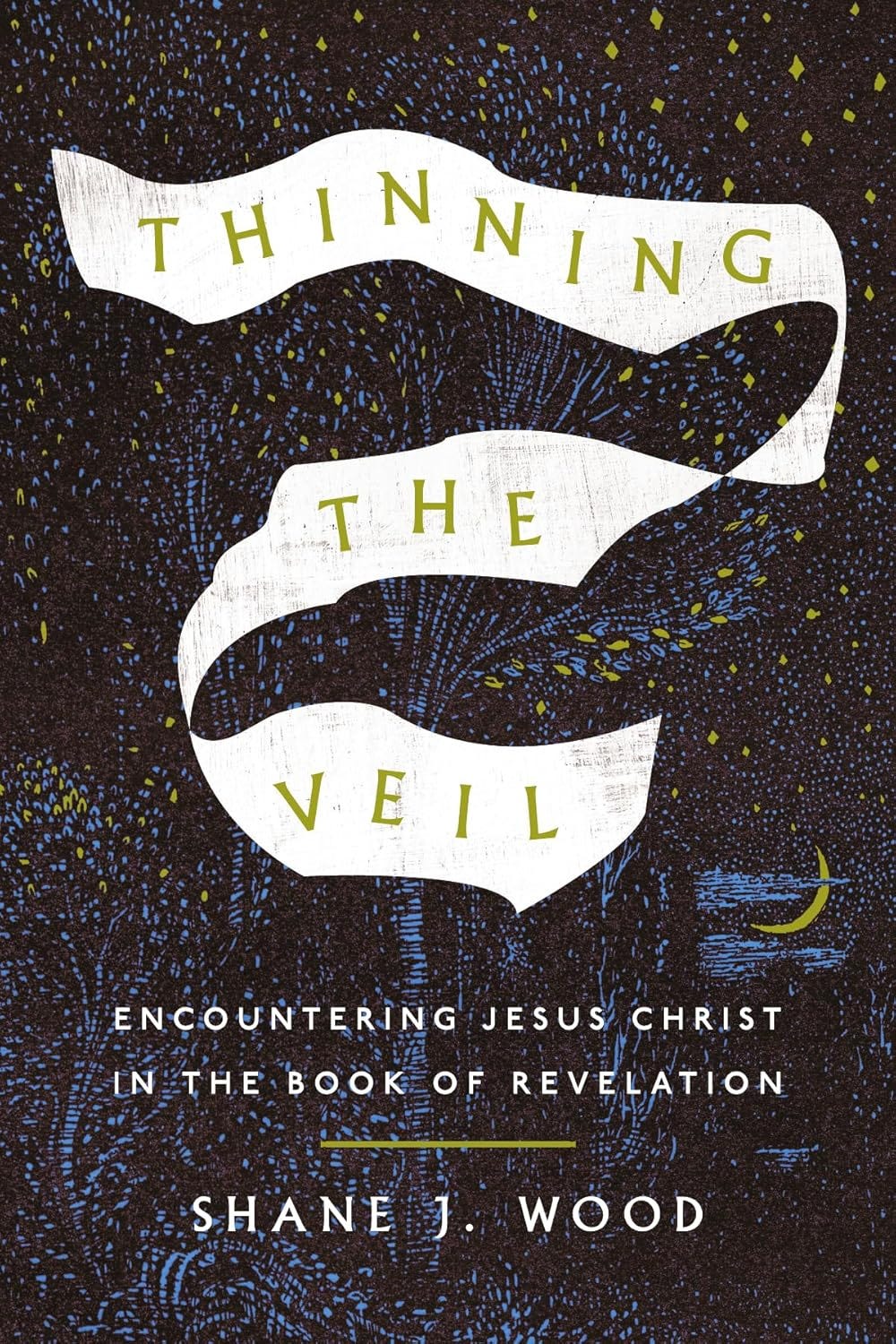Loneliness, Empathy, and God Incarnate (Guest Writer: Shane J. Wood)
Encountering Jesus in the Book of Revelation
Nijay here. I am excited to have Dr. Shane J. Wood as a guest writer today, sharing from his brand new book, Thinning the Veil: Encountering Jesus Christ in the Book of Revelation (IVP, 2025). Check it out.
Loneliness, Empathy, and God Incarnate
By Shane J. Wood
“And when I saw him, I fell to his feet as though dead. But he lay his right hand on me saying, ‘Do not fear. I am the First and the Last. The Living One. I was dead, but look! I am alive—for ever and ever. And I possess the keys of Death and of Hades’”
~ Revelation 1:17-18 ~
Two years ago, sitting down to write my new book, Thinning the Veil, I was overcome by two powerful forces: Jesus and loneliness. Even reflecting on that time sinks my stomach like the first plunge on a rickety roller coaster. Tension ignites as anticipation unfolds. Will it get worse? Will it be worth it? Are my cries rooted in delight or despair? How will this end? When will this end? God, are you there?
It’s quite a risk, so it seems, for a biblical scholar to write a book on the Revelation of St. John. Especially if prediction isn’t your goal, if red heifers aren’t your evidence, if your target is something less like a commentary and more like an unearthing. An unearthing of all twenty-two chapters, indeed, but also an unearthing of yourself. A mutual excavation. A reading of the text with a posture that invites the text to read you.
Too often, both in the academy and in the pews, we target a cerebral faith, one that values cognitive ascent over all else. Worship songs are critiqued for words or phrases that don’t match our theology, while sermons are littered with facts and maps to educate the inquiring mind. Even communion is relegated to a time of reflection, isolated mental exercises that rehearse the well-worn narrative of “I’m horrendous…but Jesus.”
Scholarly works, so I’m told, are most effective and of highest value when the exegete divorces themselves from the study, not allowing any of their faith or, God forbid, their emotions to pervert their conclusions. Just exegete; don’t insert any of you; just trust the tools.
In reading Revelation, however, I noticed the biblical authors never do this. Never divorce themselves from their writings. Never highlight only their mind but pour forth their heart, soul, mind, and strength into exploring the unfolding of God’s mystery. As they handle God’s word, mining the Old Testament for the visage of God in the face of Christ, the pursuit is quite personal. Quite revealing. A mutual unearthing of the text and the reader guided by grace.
And in Thinning the Veil, I sought to do the same.
Two years ago, I came to Revelation alone and lonely. And what I found was not rebuke or disregard, but a mirror. A reflection. My image not projected onto John of Patmos but embraced. Welcomed. Beheld as not an imposter but as a friend forged in the bonds of mutual loneliness. For Revelation 1 begins with John on Patmos alone and lonely. Separated from what was familiar. Not present at funerals for friends or birthday parties for family. Unable to worship with his community, walk with his congregants, or even frequent pubs and restaurants that know him by name. John was exiled on an island of loneliness. In desperate need of a Revelation. Not of the future. But of God incarnate. A Revelation of Jesus Christ.
The subtitle for Thinning the Veil attempts to honor (preserve, really)—or maybe even recover—the first five words of the book of Revelation. Five words often overlooked and underappreciated. Five words that carve each contour of every image that unfolds in the 404 verses of the Apocalypse, regardless of what the most recent “prophecy expert” claims. For the first five words not only guide what unfolds but heals all that’s broken on Patmos: “The Revelation of Jesus Christ” (Rev. 1:1a).
Not “the Revelation of the future” or “the Revelation of the rapture.” No, John, at the outset, sets the context for all that follows: Jesus Christ. The messages to each of the seven churches in chapters 2-3 are about Jesus Christ. The cosmic unfolding in each seal broken from the celestial scroll in chapters 6-8 is about Jesus Christ. Each blast of the trumpet from the heavenly halls in chapters 8-11, each libation poured from the plagues of the seven bowls in chapters 15-16, and even in the march of the beasts, the parade of the prostitute, and the demise of the great red dragon in chapters 13-20 is consumed by “the Revelation of Jesus Christ.” Each word, every phoneme, any and all Old Testament allusions coalesce in the Apocalypse of Patmos to reveal Jesus. To unveil Christ. To construct a picture of God’s Son so clear all rebellion would cease, every faith would strengthen, and all loneliness would dissolve in the sea of divine intimacy.
The Revelation of Jesus Christ reveals: the veil between heaven and earth is not as thick as we assume. It’s actually quite thin. Porous, really. Torn in two “from top to bottom” (Matt. 27:51) so that all outside the Holy of Holies can enter in because all that’s Holy entered the earth. Became flesh. Was, like Adam, born of virgin soil, yet, unlike Adam, embraced death not out of disobedience but fidelity. Faithfulness to a love that refuses to let sin speak creation’s final word. In Christ, God became flesh, uniting humanity and divinity in a person whose touch spans the chasm of death and loneliness (Rev. 1:17-18). Whose incarnation dispels any semblance of separation between the infinite and the mortal, the Creator and the boundaried, God and His beloved (Rev. 21:1-7).
Empathy is under attack today. And if I was Satan, I would advance the same strategy. For empathy is a potent weapon that mends broken homes, shatters racial barriers, embraces unity amidst diversity, believing that, maybe, the eyes of the other hold more treasures than threats. More worth than weapons. More of me than I fear I can behold.
At its core, the Revelation of Jesus Christ is the origin story of empathy. Where the incorporeal dared to traverse creation in my flesh, tempted in every way yet without sin (Heb. 4:15). Unveiling not just the unfathomable depths of God’s love but also what it means to be human. Truly human. Human in a way that doesn’t war with the imago dei but is empowered by it. Surrendered to it. Animated in it, regardless of what my eyes may see or my ears may hear or what lies the dragon may use to deceive. The incarnation of Christ thins the veil between heaven and earth so that, yes, I can see God more clearly, but also myself. Or, better still, how He sees me.
At its core, the Revelation of Jesus Christ is the origin story of empathy.
And there’s something about being seen, truly seen, fully and completely known by another, that tempts me to set my loneliness aside to embrace intimacy beyond what I thought possible. An intimacy that invites me to “Come” and to feast, drinking deep from the “free gift of the water of life” (Rev. 22:17), walking hand-in-hand, steps-in-sync with a crucified King who allows me to inspect his wounds with every doubt I muster. Unafraid of my wrestling, undeterred by my wandering. A tender King who bids me come and die so that, in Him, I may come alive. So that, in Christ, I may begin to see that the veil between heaven and earth is, indeed, not as thick as my loneliness believed.
In the end, I pray Thinning the Veil: Encountering Jesus Christ in the Book of Revelation challenges the reader and the scholar, the lonely and the exegete to approach the text not just with fear and trembling but with a belief that they belong in the story. Not as one who hijacks the text, but as one invited into the banquet where Christ seats you at his side so you can rest your head on his chest and listen to the sound of his heart merge with the pulse of your own. A heartbeat producing a cadence that guides each step you take, each enemy you embrace, and each turn you navigate on this journey just beyond the veil.
To order Shane’s new book, Thinning the Veil: Encountering Jesus Christ in the Book of Revelation (IVP), visit https://amzn.to/4lwELUB or wherever books are sold.







Wow. Sounds awesome.
This was a balm to my lonely soul. Thank you.